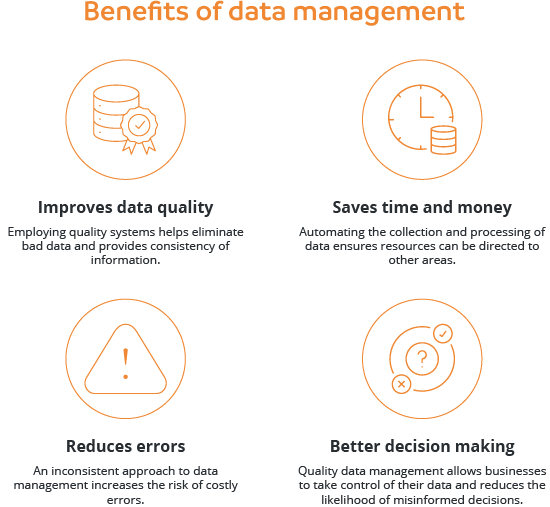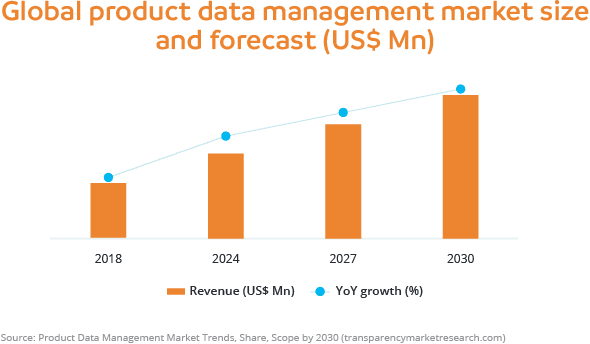5 top data management software solutions
In late 2022, the Australian Government released a 69-page document that reinforced what many businesses already know – data is a currency all of its own in the modern world. The ‘Australian Data Strategy’ highlighted how the private sector has a long history of using data to benefit its clients and that the nation has the vision to become “a modern data-driven society” by 2030.

“Data is a valuable national asset that, when leveraged effectively, can bring transformative benefits to its users and to individuals and the economy more broadly,” the strategy declared1.
Australia is not alone in recognizing the vital role of data in today’s business landscape. From global powers such as the U.S. and the UK to developing nations across Asia, Africa and the Americas, data is increasingly viewed as a corporate asset that can be used to make better-informed decisions, optimize business operations and reduce costs.
This is backed by studies that show data-driven companies are 58% more likely to surpass revenue targets than those that do not prioritize data2. The level of data that companies can access is also soaring, with MIT Technology Review reporting that the amount of data created by consumers is doubling every two years but only 1% of it is ever used, analyzed or transformed3.
Given such facts, this guide will show why quality data management strategies are essential for businesses wanting to thrive in the digital world, list the best software for managing such data and highlight why more businesses are turning to outsourcing providers to support their needs.

What is data management?
Data management is the practice of collecting, keeping and using data securely, efficiently and cost-effectively in a bid to help people optimize decision-making and take actions that benefit their organizations. The growing importance of the practice is highlighted by research that shows the global enterprise data management market size is expected to more than double from $81 billion in 2021 to $165 billion by 20304.

Benefits of data management strategies
As few as 13% of business leaders say their organization’s data strategy is a key part of their corporate strategy5, which is a concern given the benefits of quality data management including:
- Reduces duplication: with many businesses using multiple systems to store business data, the chances of duplication are immense. Rather than risking inconsistencies and information being stored in different formats, data management systems provide a single and accurate source of data, which can be better utilized for analysis and decision-making.
- Improves data sharing: data has long been available but what has changed in recent times is the ability for businesses to seamlessly share that information among their teams and partners. Scalable cloud storage is allowing entire data sets to be shared and used to support analysis. That said, a definitive strategy is essential to ensure effective governance and cataloging processes.
- Tightens privacy and security: there are few greater concerns in the data space than failing to adequately secure such information. A robust data management strategy can ensure users know where sensitive data is stored, whether it should be encrypted and who should have access to it. In the event of a data breach, it can also help identify what has been compromised and potentially limit potential fines.

5 leading data management software solutions
With countless tools and solutions on the market, selecting data management software can be a tricky business but this list of winners will help point you in the right direction.
- Ataccama ONE: imagine unifying data governance, quality and management into a single AI-powered tool across hybrid and cloud environments. Imagine no more as Ataccama ONE does just that and, in doing so, is helping businesses across multiple sectors access predictive analytics and data science. Able to be accessed from anywhere, it offers a secure environment for storing customer data and its easy-to-use design means anyone can gain the insights they need to innovate with speed while remaining in control of their data’s security and governance.
- Cloudera: hybrid data platforms are on many businesses' wish lists and Cloudera is leading the way. Providing a data storage and processing platform based on the Apache Hadoop ecosystem, it uses modern data architectures to help businesses get the most from their data and claims that “no other platform enables control of more data types across more clouds”6. From creating data meshes and lakehouses to scaling and securing data, Cloudera is the data management software of choice for many organizations.
- Amazon Web Services: backed by the might of one of the world’s biggest companies, Amazon Web Services is a cloud-based data management software that consistently delivers. By offering a huge range of tools, it allows users to put their organizational data into a cloud-data management track and perform their own on-demand computing platform computations. It also features the logistical bonus of enabling businesses to pay for the platform and any APIs they use along the way on a pay-as-you-go basis.
- Profisee: for businesses mindful of their budget, Profisee is an inexpensive data management solution that refuses to compromise on features or quality. With a user-friendly interface that ensures fast and simple onboarding, the software easily integrates with third-party data services to standardize common data. Better still, it identifies and groups sets of duplicate records using fuzzy matching logic to create distinct sets of data and defines data quality rules to prevent issues being created.
- nTask: considered one of the best data management solutions, nTask goes beyond the limits of data to encompass all the processes in a business. It features seven management modules that are full of advanced features for helping to enhance productivity and improve work quality. nTask’s virtual tools offer users a visual report of all aspects of projects, which is of particular significance when it comes to data management. A sign of its success that it is already used by 250,000 companies across 155 countries despite being relatively new to market.
Summary
With data management fast becoming a priority for businesses, it is no surprise that many organizations are not only adopting superior software and tools but seeking external support to bolster their systems. Outsourcing data management to offshore providers is on the rise and allowing businesses to access talented professionals with the technology and knowledge to manage their data securely and effectively. There is a lot to be said for focusing on data strategy rather than the tedium of collection and storage and between cutting-edge software and outsourced expertise, that can easily be the case.
With workforce challenges continuing to cause headaches across the globe, learn what businesses can do to overcome talent shortages, changing expectations and wage pressures in the recruitment market.
Reference:
[1] Australian Data Strategy: The Australian Government’s whole-of-economy vision for data (finance.gov.au)
[2] Uncovering the Hidden Insights of Data Management Statistics 2023 • GITNUX
[3] 45 Marketing Data Management Statistics 2020 | Data Services, Inc. (dataservicesinc.com)
[4] Demand for Global Enterprise Data Management Market Size & Share Will Surpass USD 165.37 Billion Market, at CAGR of 8.7% Growth By 2030 | Industry Trends, Value, Analysis & Forecast Report by Zion Market Research (prnewswire.com)
[5] Data management strategy: it's time to grow up (technologydecisions.com.au)
[6] Cloudera | The hybrid data company
Popular posts
Browse by topic
- Accounting
- Accounting & Finance
- All Industries
- Banking
- BPO/RPO/HRO
- Communication
- CSR & ESG
- Customer & Client Acquisition
- Customer Experience
- Cybersecurity
- Cybersecurity & Compliance
- Data Management
- Digital Operations
- Digital Transformation
- eCommerce
- Education
- Employee Engagement
- Engineering & Construction
- Financial Services
- Healthcare
- Hospitality and tourism
- HR & Recruitment
- Information Technology
- Insurance
- Legal Services
- Logistics
- Offshoring & Outsourcing
- Outsourcing
- Professional Services
- Real Estate
- Retail & eCommerce
- Startups
- Talent Acquisition and Retention
- Technology
- Trends & Guides
- Workforce Integration
Sign up for the offshoring eCourse
12 in-depth and educational modules delivered via email – for free
Related Posts
AI customer support: benefits, challenges and best practices
The evolution of customer support has been a sight to behold. From the birth of postal systems that allowed businesses to engage with customers in a..
The future of customer service: why 24/7 support is non-negotiable
Imagine trying to resolve an issue with a product or service late at night, only to find the company's customer service is closed. Waiting hours for..
From reactive to proactive: using offshore teams to anticipate customer needs
By 2025, Gartner predicts that proactive interactions will outnumber reactive ones1. Gone are the days when customers would just wait for problems to..
